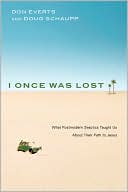
Don Everts and Doug Schaupp admit that they don't have a firm definition of postmodern (I don't know anyone who does), but they've noticed that people's views and their approaches to Christianity have shifted subtly during the past two decades. In I Once was Lost: What Postmodern Skeptics Taught Us about Their Path to Jesus, they discuss what they've learned about ministering to a postmodern culture.
This book interested me because I've sometimes wondered if I don't quite "get" evangelism. The image I was generally given of a good evangelist was either someone who worked the Romans Road into every conversation with non-Christian friends or somehow yanked these friends into church, where a fiery sermon and an altar call would do the trick. Well, most of my non-Christian friends are pretty darn smart, and there's no way I could ever "trick" any them into the faith. Any traditional evangelical efforts only result in rolled eyes and an affirmation of their beliefs about "crazy religious fundamentalists."
Some non-Christians are just waiting for an invitation to believe. But Everts and Schaupp believe that "the lost" are not simply a one-dimensional lump of humanity.
If our most sophisticated understanding of the path to faith says that our neighbor is either a Christian ("on") or not a Christian ("off"), then we tend to have just as unsophisticated a response to them. If they aren't a Christian, well, it's time to pull out evangelism shotgun to try to force the switch to the "on" position. That's what it means to "do evangelism," after all. (Which tends to explain why we so rarely engage in evangelism.)
I Once was Lost encourages Christians to match their evangelistic efforts to individuals rather than abstractions, and suggests viewing non-Christians as at different thresholds in their journey to Jesus.
The thresholds are
1) Trusting a Christian
2) Becoming Curious
3) Opening Up to Change
4) Seeking After God
5) Entering the Kingdom
I won't try to explain all the thresholds here (click the book title above if you're curious). These divisions are based on conversations the authors had with over 1,000 postmoderns about their conversion experiences. Although this is still a form of lumping people together, the categories didn't feel contrived to me. In fact, they set off little light bulbs in my head as I thought back to conversations with friends and realized, "Oh, that's where they were coming from!" (It also may explain some of my uncertainty about Mere Christianity; the book's geared toward those who are open to Christianity, but I've heard many people say that they hand it to dedicated atheists. I can't imagine this works well.)
Cons: I hit a passage that said: "If you ever feel stuck wondering what you could do to help a non-Christian friend grow, telling him or her your favorite stories about Jesus is almost always a great thing to do."
My immediate reaction was "Seriously?" That seems a little contrived to me. Most of my non-Christian friends have grown up around Christianity and they can smell "subtle" proselytizing from a mile away. Just beneath this passage, Everts and Schaupp reiterate the need "be sensitive to what level of interest [people] actually have," so my reaction may say more about my friends' levels of religion-based distrust than Everts' and Schaupp's methods. But I felt, at times, that they needed to remind readers to be natural with their Christianity--when talking about your faith, you are (hopefully) presenting the relationship and excitement about Jesus you actually have, not the relationship and excitement you think you ought to have.
All in all, however, I highly recommend I Once was Lost. Everts and Schaupp are frank about the absence of a magic, fail-proof way to convince people to believe and the fact that each non-believer is an individual, not simply another fish in the evangelism sea.
Note: Book cover image from Barnes and Noble.
No comments:
Post a Comment